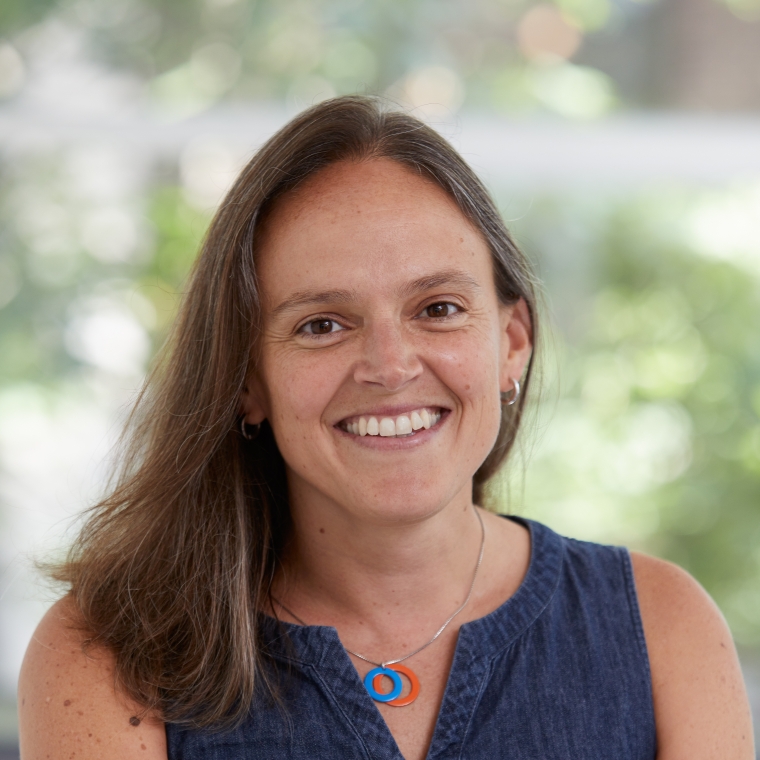

Stuart Weitzman School of Design
102 Meyerson Hall
210 South 34th Street
Philadelphia, PA 19104

Office Hours: N/A -- On sabbatical during 2025-26
Background
Francesca Ammon is a cultural historian of urban planning and the built environment. Her teaching and research focus on the changing spaces of American cities, from World War II to the present. She grounds her interdisciplinary approach to this subject in the premise that the landscape materializes social relations, cultural values, and political and economic processes. Professor Ammon is particularly interested in the history of urban revitalization, with an emphasis on urban renewal; digital public history as a tool for community-based research and engagement; and the ways that visual culture has shaped understanding of what cities are, have been, and should be.
Professor Ammon is a member of the standing faculty of the Departments of City & Regional Planning and Historic Preservation. She also directs the Initiative in the History of the Built Environment. She is an associated faculty member of the History Department and the Gender, Sexuality and Women’s Studies Program (GSWS), an affiliated faculty member of the Center for Experimental Ethnography (CEE), and a Faculty Fellow of the Penn Institute for Urban Research. Previously, she has been a colloquium member of the Penn/Mellon Foundation Humanities + Urbanism + Design Initiative and an Andrew W. Mellon DH Fellow at the Price Lab for Digital Humanities.
Beyond Penn, she serves as President of the Society for American City & Regional Planning History (SACRPH), Co-Vice Chair of the Board of the Preservation Alliance for Greater Philadelphia, and a member of the Board of the Association for Public Art.
For Prospective Students
As Director of the Initiative in the History of the Built Environment, Professor Ammon welcomes inquiries from prospective doctoral students interested in this interdisciplinary degree program that explores urban, planning, landscape, and architectural history within its social, political, and cultural contexts. Doctoral applicants whose primary interest is not historical in nature should first reach out to other faculty within the department.
Professor Ammon also welcomes inquiries from prospective master degree students who are interested in the Public History of the Built Environment (Historic Preservation) and Community and Economic Development (City & Regional Planning) concentrations.
Ph.D., American Studies, Yale University
M.Phil, American Studies, Yale University
M.A., History, Yale University
M.E.D. (Master of Environmental Design), Yale School of Architecture
B.S.E., Civil Engineering, Princeton University
Book
Bulldozer: Demolition and Clearance of the Postwar Landscape (New Haven: Yale University Press, 2016).
* Lewis Mumford Prize for best book in American planning history, Society for American City and Regional Planning History (SACRPH)
* Mellon Author Award, Society of Architectural Historians (SAH)
Digital Public Humanities
Francesca Russello Ammon, Brian D. Goldstein, and Garrett Dash Nelson, Sunset Over Sunset, 2024.
Preserving Society Hill: Sites and Stories of Urban Renewal in a Philadelphia Neighborhood (initially launched in 2018, v2 launched in 2022).
Articles and Chapters
"Urban Renewal through Rehabilitation and Restoration," in The Many Geographies of Urban Renewal: New Perspectives on the Housing Act of 1949, ed. Douglas R. Appler (Philadelphia: Temple University Press, 2023), 195-216.
"The Long History of Unfair Housing," co-authored with Wendell E. Pritchett, in Perspectives on Fair Housing, eds. Vincent Reina, Wendell E. Pritchett, and Susan Wachter (Philadelphia: University of Pennsylvania Press, 2020), 9-44.
“Refuge, Resort, and Ruin: Real Estate Development and the Identity of Asbury Park, New Jersey,” in Liberty and Leisure in North America, ed. Pierre Lagayette (Paris: Presses de l’Université Paris-Sorbonne, 2008), 41-57.
National Endowment for the Humanities (NEH) Digital Humanities Advancement Grant
G. Holmes Perkins Distinguished Graduate Teaching Award for Standing Faculty, Weitzman School of Design
American Council of Learned Societies (ACLS) Fellowship
Visiting Scholar, American Academy of Arts & Sciences
Society of Architectural Historians (SAH)/Mellon Fellowship
Whiting Fellowship in the Humanities
Ambrose Monell Foundation Fellowship in Technology and Democracy through the Miller Center of Public Affairs
John E. Rovensky Fellowship from the Business History Conference
Sally Kress Tompkins Fellowship, jointly sponsored by SAH and the Historic American Buildings Survey (HABS)
Preservation Futures: History, co-authored with Sarah Lopez, Platform (Feb 2024)
From Prints to Pixels: ’Sunset Over Sunset‘ explores urbanization in Los Angeles (Feb 2024)
Ammon featured in "LA Stories: Urbanism, Music and AI in Ed Ruscha's Archive," a GRI video in collaboration with MoMA exhibition (Sept 2023)
In ‘Changing the Face of the City,’ Philadelphians Get Inclusive View of Urban Renewal (Apr 2022)
New Interdisciplinary Initiative in the History of the Built Environment (Oct 2021)
A Visual Archive of an Iconic American Boulevard (Aug 2021)
Ammon Earns National Endowment for Humanities Grant to Study Urban Change (Dec 2020)
‘Perspectives on Fair Housing’ looks back on more than 50 years of landmark legislation (Oct 2020)
"But Why Do I Have to Take This Class? Making Required Courses More Meaningful," Penn Almanac (Nov 2019)
Weitzman Faculty Receive G. Holmes Perkins Teaching Awards (May 2019)
Francesca Russello Ammon: ACLS Fellowship (Apr 2019)
Research: Ed Ruscha's Streets of Los Angeles Project (Dec 2018)
Faculty Members Ammon and Guerra Earn Tenure from Penn (Dec 2018)
Preserving Philadelphia’s Society Hill (Aug 2018)
Francesca Russello Ammon’s ‘Bulldozer’ Earns Prestigious Mumford Prize (Nov 2017)
Lecture Notes (Jan 2017)
When Push Comes to Shove (Dec 2016)
Excerpt: Francesca Russello Ammon on the Bulldozer's Wartime Boost (Sept 2016)
Francesca Russello Ammon Talks to WNYC about the Bulldozer (Apr 2016)
SAH/Mellon Author Awards: Dr. Ammon (Feb 2014)
John Reps Prize: Dr. Ammon (Oct 2013)